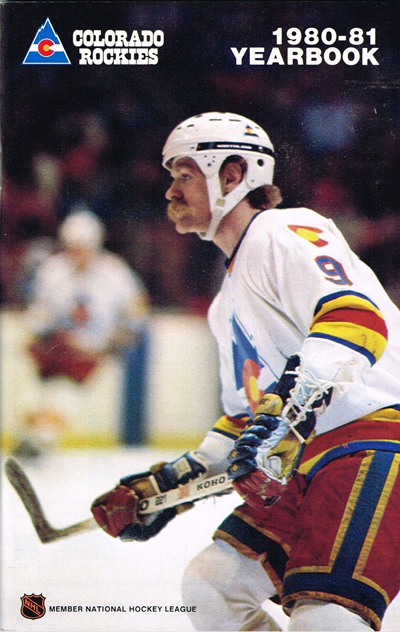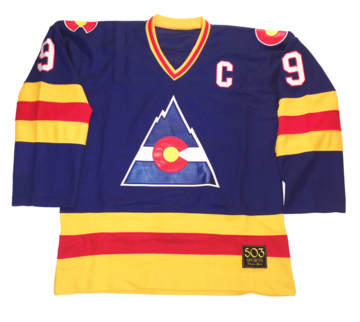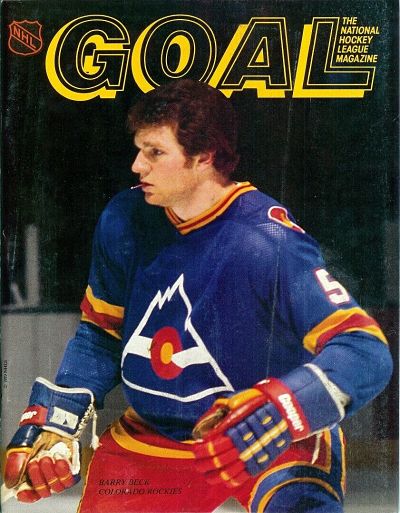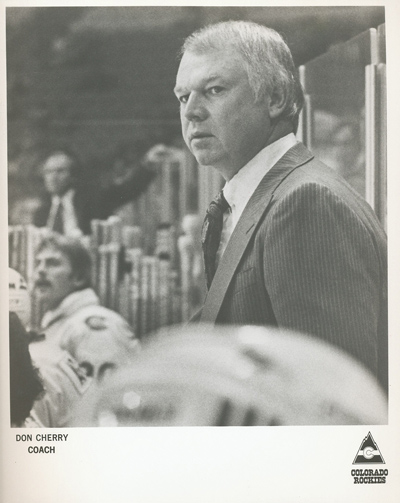National Hockey League (1976-1982)
Tombstone
Born: January 26, 1976 – The Kansas City Scouts relocate to Denver, CO
Moved: May 27, 1982 (franchise relocates to East Rutherford, NJ and becomes the New Jersey Devils)
First Game: October 5, 1976 (W 4-2 vs. Toronto Maple Leafs)
Last Game: April 3, 1982 (W 3-1 vs. Calgary Flames)
Stanley Cup Championships: None
Arena
McNichols Arena (16,399)
Opened: 1975
Demolished: 2000
Marketing
Team Colors: Blue, Red & Gold
Ownership
Owners:
- 1976-1978: Jack Vickers
- 1978-1981: Arthur Imperatore
- 1981-1982: Peter Gilbert
Retro Rockies
Colorado Rockies Replica Jersey
When it comes to Replica Jerseys, we turn to our friends at Royal Retros, who put extraordinary detail into their fully customizable hockey sweaters.
Free Customization Included
Each jersey individually handmade
Any name and number
Heavyweight sewn tackle twill
100% polyester
Heavyweight fabric made to game standards
Fight strap included
When you make a purchase through an affiliate link like this one, Fun While It Lasted earns a commission at no additional cost to you. Thanks for your support!
Background
The Colorado Rockies hockey team was a star-crossed organization that spent most of six winters in Denver seeking to move elsewhere. The Rockies began life in 1974 as the Kansas City Scouts, a poorly organized NHL expansion effort. After two grim seasons in K.C., the destitute Scouts were purchased by Colorado oilman Jack Vickers in the summer of 1976. Vickers immediately moved the team to Denver’s McNichols Arena for the 1976-77 NHL season.
Denver trudged a long, weird path to the National Hockey League. During the late 1960’s and early 70’s, the city enjoyed the minor league Denver Spurs, who played at the Denver Coliseum. In 1972, the World Hockey Association formed and fired a shot across the NHL’s bow by signing Chicago Blackhawks star Bobby Hull to an historic $1 million contract. The warring leagues soon began to a compete over expansion cities. Denver was an attractive prize, particularly with the new 16,000-seat McNichols Arena due to open in 1975.
In 1974, Spurs owner Ivan Mullenix landed conditional approval for an NHL expansion club to begin play in the fall of 1976. But with McNichols Arena ready for 1975, Mullenix pushed to get into the NHL a year earlier. The plan called for Mullenix to acquire one of the NHL’s basket case franchises of the era – either the California Golden Seals or the Pittsburgh Penguins. But those maneuvers collapsed in early 1975. With the Spurs’ future in the NHL looking shaky, Mullenix abruptly joined the rival World Hockey Association instead in that spring.
Denver fans, promised NHL hockey for more than a year, were displeased with Mullenix’s bait and switch. They stayed away in droves. The Spurs only lasted three months in the WHA before bolting town midway through the 1975-76 season.
Rocky Hockey
This was the landscape that Vickers inherited when NHL hockey finally arrived in Denver in the autumn of 1976. “Rocky Hockey” could have been a coronation after years of struggle. Instead, it was just Act II of the perverse soap opera that was Colorado hockey during the Me Decade. For starters, the Rockies were consistently terrible. The team had seven head coaches in six seasons and in their best season finished 23 games below .500. The Rockies never won a playoff game in their brief lifespan.
By the spring of 1978, Vickers had lost somewhere between $4.5 and $6 million and was fed up with his lease at McNichols Arena. The Rockies nearly move to Houston in June 1978. Instead Vickers sold the team later that summer to New Jersey trucking baron Arthur Imperatore. Imperatore was clear about his ambition to move the Rockies to New Jersey to play in the new Brendan Byrne Arena in East Rutherford but the new building wouldn’t be ready until 1981. The Rockies would stay in Denver another four years, but they always had the feel of short-timers.
1979: Don Cherry & Lanny McDonald
During the second year of Imperatore’s ownership, in 1979-80, the Rockies made their two biggest acquisitions. First, they hired the colorful former Boston Bruins chieftain Don Cherry and made him the highest paid coach in the National Hockey League. And midway through the season, they traded one of their top players, Wilf Paiement, to the miserly Toronto Maple Leafs for future Hall-of-Famer Lanny McDonald. Cherry was a fan favorite in Colorado. McDonald quickly established himself as the Rockies’ top scoring threat.
But as usual the club’s chronic instability rapidly undermined any sense of excitement or momentum. The Rockies finished in last place (19-48-13) under Cherry, while the coach clashed all season long with General Manager Ray Miron. Cherry was fired at the end of the season (no Rockies coach ever lasted longer than one season). McDonald was traded to Calgary in 1981 after playing just one full season for Colorado. And Imperatore gave up on the NHL and sold the club in late 1980. Buffalo cable TV entrepreneur Peter Gilbert became the team’s third owner in four years.
Move To New Jersey
By the spring of 1982, the Brendan Byrne Arena was open for business in the swamps of northern New Jersey. Peter Gilbert sold the team yet again, this time to Houston Astros owner John McMullen. McMullen pulled off the complex maneuver that had eluded Arthur Imperatore, paying off the New York Islanders, New York Rangers and Philadelphia Flyers to gain the NHL’s blessing to move to New Jersey in May 1982.
Postscript: Don Cherry never coached again in the NHL after being dismissed by the Rockies in the spring of 1980. But he became a Canadian icon as the between-periods host of “Coaches Corner” on CBC’s Hockey Night In Canada NHL broadcasts. In 2004, Cherry was voted the “7th Greatest Canadian” in a CBC poll.
The NHL returned to Denver in 1995 when the Quebec Nordiques relocated to the Mile High City and became the Colorado Avalanche.
Our friends at the Good Seats Still Available podcast did an episode on the NHL’s Colorado Rockies:
Colorado Rockies Video
Philadelphia Flyers host the Rockies at the Spectrum. Stanley Cup playoffs, April 11, 1978.
In Memoriam
Peter Gilbert, the final owner of the Rockies, died of cancer on March 26, 1989 at age 62. New York Times obituary.
Links
##




